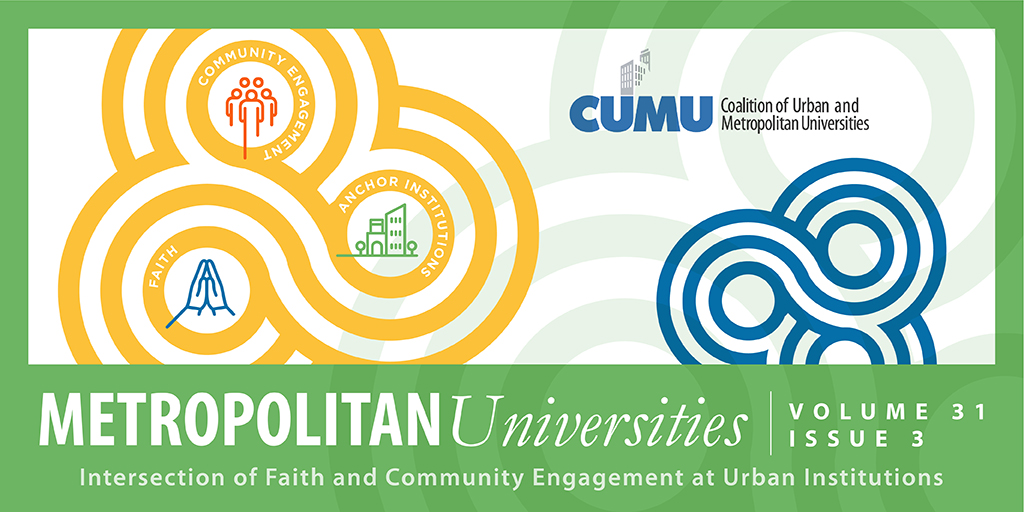Faith and Community Engagement at Anchor Institutions
Exploring the Intersection and Turning toward an Engagement of Hope
DOI:
https://doi.org/10.18060/24784Keywords:
Anchor Institution, Community Engagement, Faith-based engagementAbstract
In a year that has featured a global health pandemic, a racial justice political-social movement, and a divisive political election that stretches democratic principles, the topic of faith and community engagement may seem more prescient than ever. The exploration of the intersection of faith and community engagement at anchor institutions, though, began prior to all of these events. Yet, the topics that emerge in this special issue of Metropolitan Universities journal are even more relevant in our current context, as scholars, practitioners, and community partner co-authors explore the relationship between faith traditions and engagement in the community.
As we framed this special issue as an editorial team, faith initiatives were initially broadly interpreted and all faith traditions were encouraged and considered (including, but not limited to, Christian, Jewish, Muslim, Buddhist, and Hindu). Faith was loosely defined as a religious historical tradition and set of beliefs centered on a higher power. Faith-based organizations were generally communicated as religiously-affiliated colleges and universities, while faith-based initiatives included programs that were religiously affiliated. This special issue focuses on the intersection of faith and community engagement, specifically how they inform each other and the relationship between them at anchor institutions.
References
Clandinin, D. J., Connelly, F. M. (2000). Narrative inquiry: Experience and story in qualitative research. Jossey-Bass.
Creswell, J. W . (2012). Qualitative inquiry and research design: Choosing among five approaches. SAGE.
Donohoo, J . (2013). Collaborative inquiry for educators: A facilitator’s guide to school improvement. Corwin.
Green, P. M., Eddins, E. A., Berkey, B., Meixner, C. (2018). Exploring the borderlands through collaborative inquiry: A narrative introduction. In Berkey, B., Meixner, C., Green, P. M., Rountree, E. E. (Eds.), Reconceptualizing faculty development in service-learning / community engagement: Exploring intersections, frameworks, and models of practice (pp. 1–23). Stylus Publishing.
Lytle, S. L. (2008). Practitioner inquiry and the practice of teaching: Some thoughts on “better.” Research in the Teaching of English, 42(3), 373–379. http://ezproxy.msu.edu/login?url=https://search.proquest.com/docview/215344856?accountid=12598
McClory, R., (2010). Radical Disciple, Father Pfleger, St. Sabina Church, and the Fight for Social Justice, Lawrence Hill Book
Nash, R. J. (2004). Liberating scholarly writing: The power of personal narrative. Teachers College Press.
Pieper, J. (1997). Faith, hope, love. Ignatius Press, San Francisco.
Ravitch, S. M. (2014). The transformative power of taking an inquiry stance on practice: Practitioner research as narrative and counter-narrative. Penn GSE Perspectives on Urban Education, 11(1), 5–10.
Salter-McNeil, B. (2020), Becoming Brave, Finding the Courage to Pursue Racial Justice Now, Brazos Press
Salipante, P., Aram, J. D. (2003). Managers as knowledge generators: The nature of practitioner-scholar research in the nonprofit sector. Nonprofit Management and Leadership, 14, 129–150. https://doi.org/10.1002/nml.26
Safford, V. (2015). The Gates of Hope. Stanford Social Innovation Review. https://ssir.org/articles/entry/the_gates_of_hope
Washington, J. M. (ed.), (1991), A Testament of Hope, The Essential Writings and Speeches of Martin Luther King Jr., HarperCollins
Downloads
Published
Issue
Section
License
Copyright (c) 2020 Patrick M. Green, Cynthia P. Stewart, Daniel J. Begen, Chris Nayve

This work is licensed under a Creative Commons Attribution 4.0 International License.



